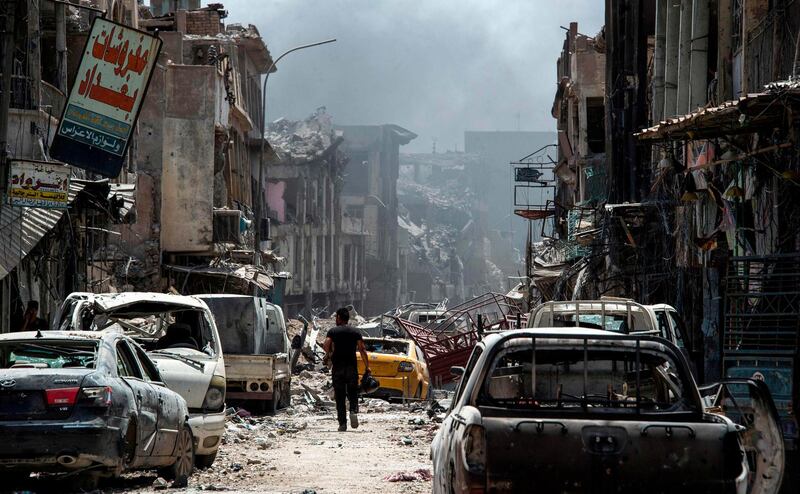Devastated by a war with ISIS that ruined its cities and left millions homeless, Iraq does not have the capacity to rebuild without major support from the international community, the country's culture minister Fariyaad Rawandizi told The National on Monday.
A Unesco conference held on Monday in Paris, which focused on reconstructing the northern city of Mosul, was attended by dozens of potential donors.
Numerous Iraqi cities were reduced to rubble in the three-year occupation by ISIS and the ensuing battles to wrestle them back.
"This conference aims to implement the initiative of rebuilding Mosul; this is very important because we cannot do this by ourselves, we don't have the capacity," Mr Rawandizi told The National.
The size of the destruction in Mosul and especially in archaeological sites was huge, he said.
“It needs national and international co-operation between Iraq and Unesco and other organisations to rebuild archaeological sites,” the minister said.
More than 40,000 houses have been destroyed and around 700,000 people have been displaced, according to UN estimates, in addition to the damage to religious, governmental and medical buildings, museums and libraries that need restoration.
“We are in need of financial international support,” Mr Rawandouzi said, adding he expects that Mosul will need $2 billion (Dh7.35bn) in reconstruction aid to unblock streets and rebuild homes.
Mosul has a unique role to play in the rebuilding of Iraq, he said.
“The city is a living symbol for the identity of Iraqis; the city is very rich in heritage and was not only known as a centre of trade but as a heartland for the culture and civilisation, not only in the Middle East but also in the world."
_________
Read more:
WATCH: The liberation of Mosul one year on
UAE rebuilding of Mosul mosque 'defeats extremism'
How eliminating the ‘kill box’ turned Mosul into a meat-grinder
Mosul’s health care in ruins a year after the battle
_________
Iraqi forces fought for nearly nine months to seize Mosul from ISIS, backed by United States-led coalition air strikes that flattened the historic city.
Iraqi Prime Minister Haider Al Abadi declared "victory" against the insurgents across the country in December. But the minister warned that remnants of the group still remained.
“Iraq is still fighting pockets of ISIS around Mosul and in southern Kirkuk and in Anbar, but ISIS has been defeated and cannot come back again,” Mr Rawandizi said.
It was from the Grand Al Nuri Mosque that ISIS leader Abu Bakr Al Baghdadi in July 2014 declared a self-styled “caliphate”, spanning parts of Syria and Iraq the insurgents controlled.
Unesco’s biggest project, funded with $50.4 million from the UAE, is restoring the 12th century mosque and its leaning minaret, which were both blown up by the insurgents last year.
UAE Minister of Culture Noura Al Kaabi told The National that Abu Dhabi will head two committees alongside Iraq's Culture Ministry and the Iraqi Sunni Endowment to help to support the project.
"They are a technical committee and a higher committee that includes the Sunni endowment and ministry officials," Ms Al Kaabi told The National.
The first meeting will be in Abu Dhabi on Thursday where high-level discussions about the reconstruction efforts will take place.
The Emirati minister emphasised the importance that Iraqi youths will have in the project, ensuring they become a key fixture in the five-year reconstruction of their city.
“We want to focus on how we can offer 1,000 job opportunities to men and women,” she said. “We have a lot of graduates from Mosul and Baghdad University.”
Ms Al Kaabi said the committees are crucial as they will bring all parties involved in the reconstruction efforts together.
“The most important thing is that in 2023 we are going to enjoy a beautiful tour of the Grand Nouri mosque,” she said.
Mr Rawandizii expressed his gratitude to the UAE for standing alongside Iraq to protect its culture.
“The mosque is one of the most important archaeological sites in Mosul because it’s the identity of city,” he said.





